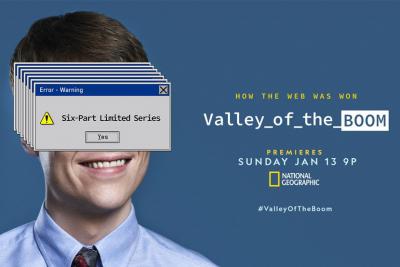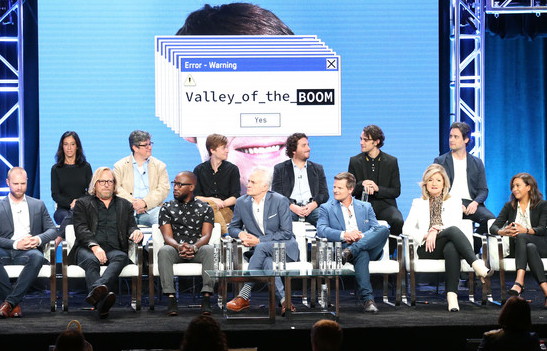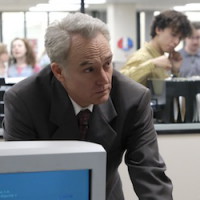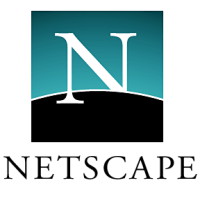Guide to Nat Geo's VALLEY OF THE BOOM: Q&A w/ Cast & Producers, Overview, Episode Guide, Fun Facts
Mike Vicic - January 13, 2019

On Sunday, January 13, 2019 at 9pm ET/PT, National Geographic Channel premieres the six-part limited series, VALLEY OF THE BOOM that features an unconventional hybrid of scripted storytelling and documentary interviews with the key players whose stories are dramatized in the show. Silicon Valley spawned some of the world’s most influential people and recognizable brands during the 1990s and attracted geniuses and charlatans alike. It’s also where the new phenomenon of the overnight tech millionaire was born. Using a blend of narrative devices and interviews with the real subjects and experts woven into scripted drama, creator/director Matthew Carnahan charts the meteoric rise and cataclysmic burst of the dot-com bubble. The series follows the turbulent ride of three different companies whose founders were trying to change the world using the emergent technology of the internet. Netscape pioneered the first commercial web browser and battled Microsoft in the “browser wars.” Before Facebook, TheGlobe.com was a rapidly expanding social networking site built by dreamers on a college campus. And before YouTube, a con artist on the run from the FBI reinvented himself and started a streaming video company called Pixelon, resulting in an entrepreneurial rise and fall almost too insane to be believed. Each storyline in the series features the hallmarks of an epic saga — wealth, greed, manipulation and con artists. VALLEY OF THE BOOM is stranger than fiction and it is all (mostly) true!
VALLEY OF THE BOOM stars Bradley Whitford, Steve Zahn and Lamorne Morris. The documentary-style interviews that support the drama include experts from the era: Mark Cuban, Dan Goodin, Arianna Huffington, President and CEO of Netscape, James Barksdale, Netscape founder Jim Clark and co-founders of theglobe.com Stephan Paternot and Todd Krizelman.
This past year TV Tango attended the Television Critics Association (TCA) Press Tour, where Nat Geo presented a panel that included cast Bradley Whitford, Steve Zahn, John Karna, Oliver Cooper, and Dakota Shapiro; Executive Producers Matthew Carnahan and Arianna Huffington; and Stephan Paternot Co-Founder, TheGlobe.com and Tara Hernandez former Manager, Netscape Build Engineering Team. Here are a few highlights (edited for clarity and readability) from that panel.

At the Television Critics Association (TCA) Summer Press Tour in July 2018 at The Beverly Hilton Hotel.
(Back Left-Right) Tracy Barone, Tara Hernandez, John Karna, Oliver Cooper, Dakota Shapiro and Stephan Paternot.
(Front Left-Right) Joel Ehninger, Matthew Carnahan, Lamorne Morris, Bradley Whitford, Steve Zahn, Arianna Huffinton and Jada Miranda.
|
|
|
Steve Zahn as Michael Fenne |
Question: Steve, can you tell us what you find fascinating about Michael Fenne and what’s fun for an actor to play a guy who is out there in so many ways? Steve Zahn: I got eight pages into the script and I was like, “I am so in for so many reasons, and the big one is this guy.” Actually, there was one interview that was sent to me, and I thought this guy was like P.T. Barnum. I thought this guy was this boisterous, southern Baptist -- and then I saw the video, and here's this soft-spoken, very intelligent, very eloquent, humble person, and it kind of threw me for a loop. And then I thought how the hell am I going to play this guy? And Matthew said, "You're just going to have to dive in, man,” which I did. But it's truly one of the favorite characters I've ever played. I mean, it was really challenging, and so glad to be a part of it. We just made like a fat suit and we put on a wig, and I felt like I was in some play in high school. It was insane. |
|
|
|
|
|
Arianna Huffington |
Question: What made you want to tell the story of the origins of the internet? Matthew Carnahan: actually, I never would've come upon this myself. I have Jada Miranda to thank for that from STX, and the Nat Geo people who were already kind of invested and interested in the project. And when I started digging a little I said, "Okay, I would like to do this, but I have to be able to just ruin your network. I have to be able to blow everything up. I have to be able to try at least to do something as disruptive as the makers and innovators who started the Internet and invented the browser and created social networking. We wanted to be able to illustrate, for example, the browser war between Netscape and Microsoft, and I burn out after about three talking heads. So, we were like, "Okay, let's do a rap battle, let's get two great rappers, and we'll write a great rap battle and let them explain the browser war." This show is very much about a group of people who, after being crushed by a giant corporation, Microsoft, still, or while they were in the throes of being crushed by Microsoft, they pushed their source code out onto the Net. It was heroic, what they did. And it speaks volumes about what innovation in any field should be. And right now we are losing our net neutrality, and we're in a scary, scary moment, in my opinion. And this is the time to tell stories like this, about people who push back. |
|
Tara Hernandez: The key to the Internet that we always believed was that it was about disruption, right? Yes, some industries have been poorly affected by what the Internet has introduced. But the voices of so many other people have been raised because of that, and every year, we have more tools that allow more people to have their voices heard, to organize – like the Arab Spring. Those of us who worked at Netscape looked at that and went, "Wow." That's the sort of thing that we hoped for and could never imagine. So, it's a tradeoff. There's going to be good, and there's going to be bad. But, you know, for those of us who are still slogging around in the industry, we want to continue to make that difference. Arianna Huffington: But it was also about disruption of power structures, because the browser gave everybody access to information, and information is power. And now what's happening is that actually, it's more powerful to have curated information. Having access to all the information in the world, having everything coming at you is no longer a source of power. It's a source of distraction. And that's why many people are drowning in data and starved for wisdom. So, for me, that's what makes this moment for the VALLEY OF THE BOOM so compelling, because you can look directly at the contrast between these two eras. |
|
|
|
Dakota Shapiro as theGlobe.com co-founder Stephan Paternot |
Question: When did the internet become a vital part of your careers? Arianna Huffington: What Matthew captured so brilliantly at this moment of the birth of the Internet is how dramatically different it all was than it is now when we've all become much more skeptical, much more conscious of all the unintended consequences of addiction to social media and constant interruptions, constant notifications. The mood you're going to see here is a mood of idealism, triumphalism. It was expected to basically change the world and that's why you had the first expression of real fear of missing out. Everybody wanted to be on the internet train even if they had no clue where that train was going. Bradley Whitford: I think that the internet for our particular world is a golden age for research as an actor because you can pull out your phone and see how somebody talked and walked through the entire span of their careers. I think this is the most spectacular time in storytelling with all the streaming services that the Internet has provided and transformed Hollywood. But there is this idealism here in this naiveté about the possibilities of this very much like the birth of television which was going to bring opera and art to the masses. Well, guess what? Communities of nursing mothers and Nazis, you know. It’s a weird mix. And I feel like the Internet’s been great for show business and we are just realizing the unintended consequences. It would be better for my kids if we lived in the wisdom age. |
|
Dakota Shapiro: What's also amazing about the time in which the show takes place is like this is a time period in which the Internet was completely optimistic. None of this cynicism existed yet for it. So we're just seeing the birth and the ideas and the idealism behind the Internet which I think is really amazing. |
|
|
|
 Oliver Cooper as theGlobe.com co-founder Todd Krizelman |
Question: How much do you think the internet itself has influenced our expectations of how information will be delivered? Stephan Paternot: First of all, I'm very humbled to have had the Globe story included in this series. There is a lot of other pioneers out there. Maybe ours was iconic only because we had the rise and we had the fall. We're actually seeing the pendulum swing for the first time in thirty years. There was purity when we started the Internet twenty-five plus years ago, to create this global village where everybody would be connected, a sort of utopia. And of course, to execute these dreams requires massive amounts of capital. VALLEY OF THE BOOM really shows you the need for capital to marry the creativity so that things can be invented. But then it also shows the double-edged sword of the capital corrupting the original vision. We’re starting to see the bad; the echo chambers, the power assimilation by a handful of companies, net neutrality being pushed aside. And, so, there’s a counter option that’s beginning right now in our time which is the beginning of Web 3.0 - decentralization, block chain, Crypto - all of these new things as a means to pull back and get rid of the fake news and take power away from all of these major companies. This show has become highly relevant at this exact moment in time. |
|
Bradley Whitford: What was exciting to me was the resonance between how we were telling this story and the story that was being told in a very much different way. This will age me, but there was a real epiphany to me when I saw Ken Burns’ Civil War series, I was like, “Oh, my God. That is the best way to learn this not from a book.” And I think we’re now exploring ways in filmmaking and storytelling that change the way we get information, and we do have impatience in terms of attention span. Matthew Carnahan: It’s affected the way we assimilate information massively. Everything has become accelerated. There's no such thing as avant-garde or underground anymore because it’s instantly digestible. Arianna Huffington: So this is about capturing the imagination of the viewers and when you capture their imagination you entertain and inform at the same moment. And, for me, because I’m so interested in the Internet 3.0 era that we’re in now and all the unintended consequences, I felt that by understanding the origin we will find better ways to deal with the damage that’s being done right now -- the rise in depression and anxiety among girls addicted to the social media; how much harder it is to distinguish between facts and fiction. All that stuff that we are all dealing with now and begun in another era that never really saw or foretold what was coming. Tara Hernandez: What’s one of the most successful educational websites that we have out there? The TED Talk. A TED Talk is ten minutes, right? Or maybe twelve if they’re really pushing it, right? And when you’re watching your TED Talk, alongside of the page you’ll see about six other TED Talks. So, that’s faster than switching channels in TV. So, it’s about content creation, but even more about retaining what we used to call “eyeball time” on a particular site. That was a big phrase that we had back in the nineties for a long time. Whoever can retain the eyeballs controls the content and delivery that controls the message. Oliver Cooper: I also think it was about doing something -- Like what was exciting to me was that it was something different. Everybody wants to see something different, and when I read the rap battle scene in the script I was like, “Wow, this is really unique,” and that’s exciting as an actor to be a part of something like that, for sure. |
|
|
|
|
Bradley Whitford as Jim Barksdale in VALLEY OF THE BOOM |
Question: Don’t you feel like this rush for content and not paying writers what they’re worth might have something to do with all of these problems? Stephan Paternot: Yes. I think, like all good things, and all good visions, we like to binge on them a little and experience this new thing until we get fatigue. So, it's a question of making adjustments, and the original intent of the Internet, again, was connect the world, create this global village, and it has brought that in. And with it, it has brought a bunch of other things, now, right? This mass consumption, the echo chambers, and we're having to compensate. So that's why I'm saying, right at this moment, everyone here is getting a little bit tired of the noise, the echo chambers, the lack of facts. And now we need new mechanisms to help save us from ourselves and create greater depth and greater trust of sources and people. A rebirth of the Internet is occurring. It's occurring right now around us. |
|
Arianna Huffington: For me, actually, it's much simpler. It's really about each one of us taking back control. The Internet is a tool. You can use it for bad; you can use it for good. And this is the time for us to decide that we need to protect our humanity, we need to protect the connections that matter to us rather than a lot of the ersatz connections that the Internet provides. And that requires action. It requires, for some of us, including myself, turning off all notifications. I don't really care if you started following me on Instagram. I don't need to have my life interrupted to find that important fact out right now That can wait. And I don't frankly care what President Trump just tweeted. So, I think we need to take back control. It's a really important existential moment, our attention, our time, which is really our lives, have been hijacked. This is the third stage of the Internet. And all that was not in sight during the first stage of the Internet, but it was all being driven by the idea that we were changing the world, and that we would change the world for the better by adding value to people's lives. And now we're recognizing we're also subtracting value from people's lives. Bradley Whitford: It's a very interesting time for this story because there is an adjustment. Is the Internet going to own us? Are we going to be at the mercy of it? Is it leading to more life or more Internet? Three most dangerous words to me today are "and now this." Because the moment I hear that, separated families are in the rear-view mirror, treason is in the rear-view mirror. All sorts of, leaving the Paris Accord is in the rear-view mirror. |
|
|
|
EPISODE GUIDE
"Print (“hello, world”)" (Premieres Sunday, January 13, 2019 @ 9/8c) |
ABOUT THE VALLEY OF THE BOOM FEATURED COMPANIES
|
|
Netscape Jim Clark and Marc Andreessen founded Netscape in 1994 with the goal of being the No. 1 internet browser in the world. After an incredibly lucrative initial public offering it seemed like they were right on track. The established team at Microsoft, however, was determined to destroy the competition. In VALLEY OF THE BOOM, Carnahan exposes Netscape’s struggle in this battle known as the “browser wars” through the eyes of Bradley Whitford as James Barksdale, John Murphy as Clark and John Karna as Andreessen. Carnahan uncovers the method of the masterminds of Netscape’s extraordinary rise and fall, offering an up-close and personal account of the company’s historic IPO and what followed. |
|
|
TheGlobe.com While the browser wars raged on, determined students Todd Krizelman, played by Oliver Cooper, and Stephan Paternot, played by Dakota Shapiro, were busy founding theglobe.com at Cornell University. Krizelman and Paternot struggled to fund their venture initially but they were ultimately able to take their social networking site from their dorm rooms to one of the largest tech IPOs in history. Theglobe.com set a record for the highest first-day price gain for a new stock offering in 1998, changing the co-founders lives forever. In VALLEY OF THE BOOM we hear their story directly from the source, as Carnahan includes interviews with the two. |
|
|
Pixelon While Krizelman and Paternot were prepping for their IPO, con man Michael Fenne, played by Steve Zahn, moved across the country, reinvented himself and founded Pixelon, a multimillion-dollar streaming video tech company. Fenne was on the run from the law and his entire company’s existence was built on deception. He conned investors out of hundreds of thousands of dollars while promising them high-quality streaming on the internet that never actually materialized as advertised. iBash was Fenne’s extravagant, multimillion-dollar launch party that resulted in an even more extravagant failure. The series uncovers all of Fenne’s secrets to show just how quickly Pixelon crashed into bankruptcy. |
TIMELINE OF SILICON VALLEY IN THE 1990S
- 1990
- The first internet search engine, “Archie,” is launched from Montreal, indexing publicly available files and allowing users to download them.
- The first internet search engine, “Archie,” is launched from Montreal, indexing publicly available files and allowing users to download them.
- 1991
- The World Wide Web makes its debut on the internet.
- Finnish student Linus Torvalds launches the Linux operating system.
- Two students at the University of Minnesota, Paul Lindner and Mark McCahill, create “Gopher,” a program that can access the World Wide Web.
- The World Wide Web makes its debut on the internet.
- 1992
- Librarian Jean Armour Polly coins the phrase “surfing the internet.”
- Engineer Neil Papworth sends the first text message, which read “Merry Christmas,” changing the fate of humanity forever.
- Librarian Jean Armour Polly coins the phrase “surfing the internet.”
- 1993
- Former Stanford University professor Jim Clark hires Marc Andreessen, who had led the development of Mosaic, one of the first internet browsers, at University of Illinois, Urbana-Champaign, and the two begin work on Netscape Navigator.
- Adobe launches Acrobat and the PDF format on June 15, with an eight-page ad in The Wall Street Journal.
- Former Stanford University professor Jim Clark hires Marc Andreessen, who had led the development of Mosaic, one of the first internet browsers, at University of Illinois, Urbana-Champaign, and the two begin work on Netscape Navigator.
- 1994
- Apple’s digital camera QuickTake 100, one of the first consumer digital cameras, is launched.
- On Nov. 7, WXYC 89.3 at University of North Carolina at Chapel Hill becomes the first digital radio station.
- The first smartphone is introduced in the form of IBM’s Simon.
- Apple’s digital camera QuickTake 100, one of the first consumer digital cameras, is launched.
- 1995
- Netscape goes public before even earning a penny, starting the dot-com boom.
- Microsoft launches Internet Explorer.
- Bill Gates meets with the Netscape team and the browser wars begin.
- Meanwhile, Amazon.com is launched, touting itself as the world’s largest bookstore.
- Craig Newmark starts Craigslist.
- Sun Microsystems launches Java.
- Stanford University electrical engineering graduate students Jerry Yang and David Filo transform their website, Jerry and David’s Guide to the World Wide Web, into what is today known as Yahoo.
- In Hollywood, “Toy Story” becomes the first feature-length computer-animated film, winning the hearts of adults and children alike.
- The MP3 standard is introduced.
- Netscape goes public before even earning a penny, starting the dot-com boom.
- 1996
- Hotmail is born and becomes the most popular mail program.
- Nokia introduces its first smartphone, the popular Nokia 9000 Communicator.
- The first Palm Pilot hits the market.
- Macromedia introduces Flash.
- The first DVD player (by Toshiba) makes its way onto the market.
- Hotmail is born and becomes the most popular mail program.
- 1997
- Netflix is founded.
- Netflix is founded.
- 1998
- Netscape makes its browser available for free and launches the open-source project Mozilla.
- AOL acquires Netscape.
- The first e-book reader is released.
- Google is founded by Stanford University Ph.D. students Larry Page and Sergey Brin.
- Netscape makes its browser available for free and launches the open-source project Mozilla.
- 1999
- iBash takes place. Michael Fenne rents out the MGM Grand, hiring KISS, the Dixie Chicks, Sugar Ray and even The Who for a reunion performance to debut his streaming video technology.
- Bill Gates becomes America’s richest man, worth nearly $100 billion.
- iBash takes place. Michael Fenne rents out the MGM Grand, hiring KISS, the Dixie Chicks, Sugar Ray and even The Who for a reunion performance to debut his streaming video technology.
- 2000
- The dot-com bubble bursts.
- NASDAQ stock market crashes and takes trillions of dollars down with it.
- The dot-com bubble bursts.







